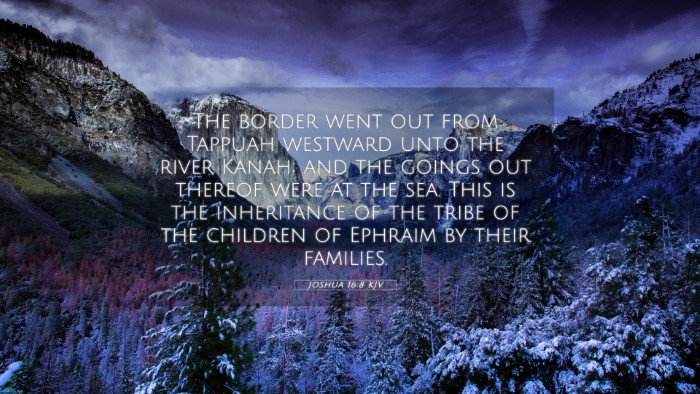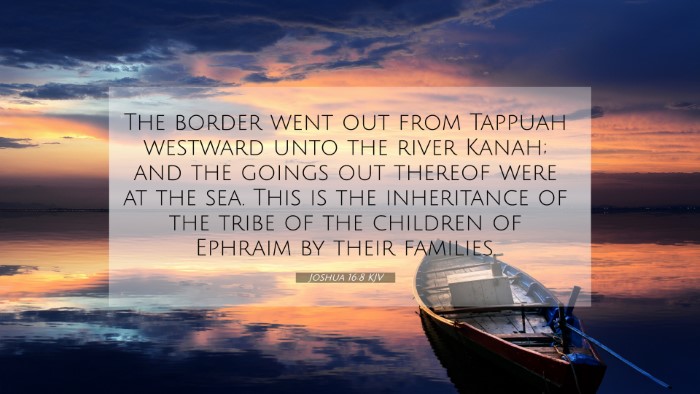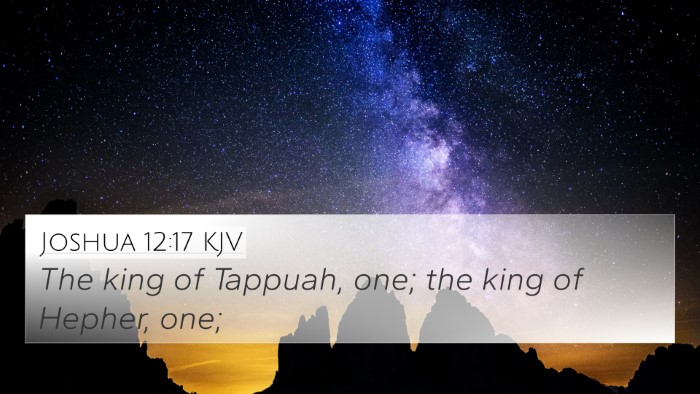Old Testament
Genesis Exodus Leviticus Numbers Deuteronomy Joshua Judges Ruth 1 Samuel 2 Samuel 1 Kings 2 Kings 1 Chronicles 2 Chronicles Ezra Nehemiah Esther Job Psalms Proverbs Ecclesiastes Song of Solomon Isaiah Jeremiah Lamentations Ezekiel Daniel Hosea Joel Amos Obadiah Jonah Micah Nahum Habakkuk Zephaniah Haggai Zechariah MalachiJoshua 16:8 Similar Verses
Joshua 16:8 Cross References
The border went out from Tappuah westward unto the river Kanah; and the goings out thereof were at the sea. This is the inheritance of the tribe of the children of Ephraim by their families.
Uncover the Rich Themes and Topics of This Bible Verse
Listed below are the Bible themes associated with Joshua 16:8. We invite you to explore each theme to gain deeper insights into the Scriptures.
Joshua 16:8 Cross Reference Verses
This section features a detailed cross-reference designed to enrich your understanding of the Scriptures. Below, you will find carefully selected verses that echo the themes and teachings related to Joshua 16:8 KJV. Click on any image to explore detailed analyses of related Bible verses and uncover deeper theological insights.
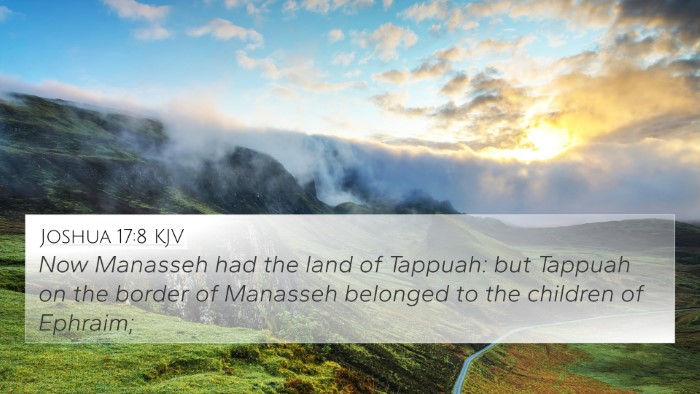
Joshua 17:8 (KJV) »
Now Manasseh had the land of Tappuah: but Tappuah on the border of Manasseh belonged to the children of Ephraim;
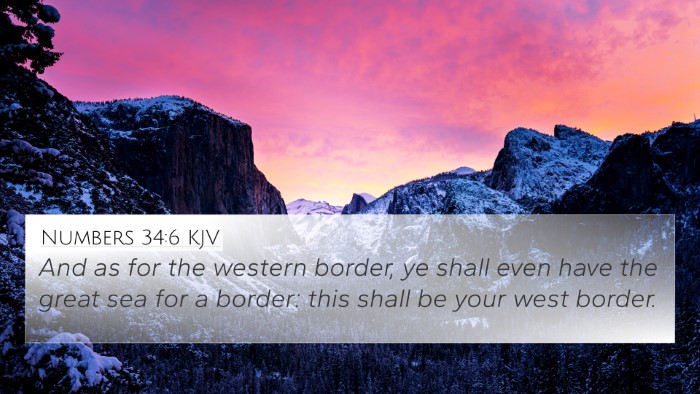
Numbers 34:6 (KJV) »
And as for the western border, ye shall even have the great sea for a border: this shall be your west border.

Joshua 16:3 (KJV) »
And goeth down westward to the coast of Japhleti, unto the coast of Bethhoron the nether, and to Gezer; and the goings out thereof are at the sea.
Joshua 16:8 Verse Analysis and Similar Verses
Understanding Joshua 16:8
Verse Context: Joshua 16:8 states, "The border went down from Taanach to Jabbok, east of Nablus." This verse describes part of the boundaries of the tribe of Ephraim as they received their inheritance in the Promised Land.
Verse Meaning Explored
This verse plays a crucial role in understanding the geographical limits of the Ephraimite territory. As per the public domain commentaries:
-
Matthew Henry:
Henry emphasizes the historical significance of borders in the Promised Land, noting that they were established by divine guidance to ensure each tribe received its rightful inheritance. He highlights that God’s promises are perfectly fulfilled, as the boundaries were meticulously drawn.
-
Albert Barnes:
Barnes discusses the natural divisions in the land and how they reflect God’s order. He explains that the delineation of borders also demonstrates God’s sovereignty over His people, controlling their lives and lands, affirming that the descriptions provided are important for understanding the heritage of Ephraim.
-
Adam Clarke:
Clarke further analyzes the geographical references, clarifying the locations mentioned and their importance for the Ephraimites. He points out the significance of these borders in biblical history and how they relate to the overall context of Israel’s inheritance.
Cross-References and Thematic Connections
Understanding Joshua 16:8 is enhanced when viewed in conjunction with other scripture passages. Here are several relevant cross-references:
- Numbers 34:3-5: Discusses the borders of the Promised Land.
- Joshua 17:1-2: Details the inheritance of Manasseh, illustrating the family ties with Ephraim.
- Genesis 48:14-20: God’s blessing on Ephraim and Manasseh is pivotal in understanding tribe dynamics.
- Deuteronomy 1:7: Highlights the geographical expansiveness of the inheritance promised to Israel.
- 1 Chronicles 7:20-22: Provides additional information about the descendants of Ephraim.
- Joshua 14:1-2: Describes how the tribes received their inheritance through Joshua.
- Isaiah 11:13: Reflects on the historical significance of Ephraim in prophetic literature.
- Luke 3:36: Ties the genealogy of Jesus back to the tribe of Ephraim through historical lineage.
- Hebrews 11:9: Points to the faith of Abraham in the promises associated with the land.
- Psalm 78:67-69: Reflects on God's choices regarding the tribes of Israel.
Theological Implications
This verse raises critical questions regarding:
- The nature of inheritance: The land represents more than property; it signifies God’s promise and the identity of His people.
- God’s fulfillment of promises: The exactness of the borders affirms God’s faithfulness throughout generations.
- Inter-Biblical dialogues: This inheritance is continually referred to throughout the scriptures, linking themes of land, identity, and divine favor.
Tools for Further Study
To deepen your understanding of Joshua 16:8 and its connections, consider the following resources:
- Explore a Bible concordance for locating similar themes and verses.
- Utilize a Bible cross-reference guide for comprehensive study methods.
- Engage in cross-reference Bible study to uncover thematic links.
Conclusion
Joshua 16:8 invites readers to consider the physical and spiritual dimensions of land inheritance. By understanding its context and exploring related scriptures, individuals can appreciate the rich tapestry of God’s promises and their fruition in the lives of His people.

